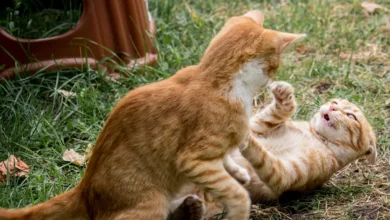
A cat adopted from the street will certainly be much safer in the shelter of a home. In addition to love, food and care, an indoor cat is not exposed to many of the urban risks (hit by cars, dog bites, aggression, etc.). However, even in a home there are enough risks to which the cat can expose itself when no one is around. In this short guide, you will discover what dangers threaten your cat when it is alone at home.
Don't expect your cat to sleep peacefully or read a book under the blanket while you're away from home. If you want to convince yourself of this, the recommendation is to install surveillance cameras in the areas where the cat has access. You'll be surprised how much her behavior can change when she's home alone.
By their nature, cats are extremely curious, playful animals with a strong predatory instinct. These traits make them explore every corner of the house, climb on furniture and hunt for any movement. Curiosity can lead them to venture into dangerous places, such as tight spaces or behind appliances, where they can get stuck or injure themselves. Vigorous play and running around the house can lead them into risky situations, such as knocking over heavy objects or bumping into each other during jumps. Their predatory instinct drives them to hunt insects or small objects, which they may accidentally swallow, causing them health problems.
Here are the dangers that threaten the cat when it is left alone at home and some recommendations that you must take into account:
1. Do not leave cords, "rods", strings or cords to the cat. The cat may play with them until they accidentally choke or swallow them. You can leave him balls, a toy mouse, or other toys that he can't swallow or get stuck in.
2. Do not leave plants near the cat. Many plants are very poisonous to cats, some with a risk of fatality. Out of play or curiosity, many cats are tempted to bite houseplants.
Read:
3. Keep toxic substances and medicines hidden. The cat has a habit of licking containers and bottles, and some substances in them can be fatal. She can also play with a medicine box and swallow them.
Read also: Toxic Essential Oils for Cats (doTERRA Top 5)
4. Pay close attention to electrical cables. There are cats that like to gnaw on electrical wiring or Christmas tree fixtures. Try to keep them well hidden or unplugged as much as possible to avoid electrocuting your cat.
5. Block access to tight spaces. The cat's exploratory nature can take it to places in the house that are hard to imagine. Behind the washing machine, behind the fridge or behind a cupboard are just a few of the places where the cat could get stuck.
6. Open or half-opened windows are among the greatest dangers that threaten the cat left alone at home. Even if you have insect screens on the windows, they are not designed to support the weight of a cat, and the risk of a cat escaping or falling from a height is extremely high. When the cat spots a bird or insect on the window, its predatory instinct may cause it to attack and try to get through the mesh.
In addition, windows left open in the rolled-down position are extremely dangerous for cats. In the desire to get out, the cat can get caught like scissors in the rolled-down window, and desperate attempts to escape can make the situation even worse. Many times, in the absence of someone to intervene to help the cat, it can lose its life.
7. Do not leave household appliances plugged in when the cat is alone at home. Out of play or curiosity, the cat can knock down a TV, a monitor, an audio system or a lamp left in the socket. The risk of causing serious accidents or burning down the house is very high.
8. Turn off the water in the bathroom when you leave the cat home alone. If it has access to the bathroom, from play, the cat can let go of the water.
In addition to those mentioned above, there can be many other dangers that threaten the cat left alone at home. It's good to keep these tips in mind even if your cat seems to be less active and curious. When left alone at home, cats can change their behavior. They may become more active, stressed, scared or with a greater appetite to discover new things.
In the case of small cats, things get more complicated. The recommendation is not to leave kittens alone at home. They have a high appetite for playing and exploring the entire perimeter of the house. They can get stuck in drawers, closets or other narrow places, they can get caught in curtains or drapes, they can have life-threatening objects knocked over them.



